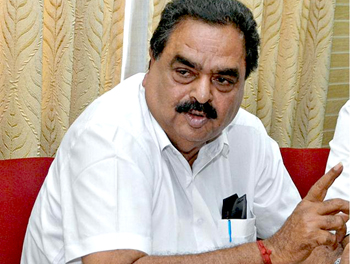Mangaluru, Jul 26: Frankly responding to media persons query on reports of his son creating ruckus in public, Congress leader and minister B Ramanath Rai said that no one was above the law.

He also clarified that he is not responsible for his son's mistake as it is difficult to control grown up children.
Cited Union minister DV Sadananda Gowda's son Karthik's sex with model case, Mr Rai said: “Some people pressured me to hold a protest, but I did not since I know it's difficult to keep a tab on what your children are doing after they cross a certain age."
He said once a person approached him claiming he had a recommendation letter from his (Rai's son) for a transfer. "I sent him away, saying I would transfer him to a place where there is no water,'' he added.
On Sunday, Mr Rai's son Deepu Rai and two of his friends -- Tejas and Ganesh -- were partying in their car parked on a private road leading to the house of former Madikeri gram panchayat president Mandamada Tejappa. Disturbed by the loud music and shouting, Tejappa and neighbours asked the trio to leave the place.
Taking offence, the trio entered into an argument with the public, asking them who they were to question them. Later, angry villagers reportedly thrashed the trio. At Srimangala police station, police made both groups strike a compromise and settled the case by taking written undertakings from both.
Also Read : Minister Ramanath Rai's drunk' son creates ruckus in public






Comments
Yes Mr. Raii is absolutely right. You cannot follow your grown up children where they go and what they are doing . \ KAALA BADALAAGIDE SWAMY\""
Mr. Ramanatha Rai you can't control your own son how can you control District ??? you are a District incharge Minister.
Good example unlike Binaca Gowda....
Add new comment